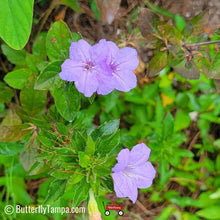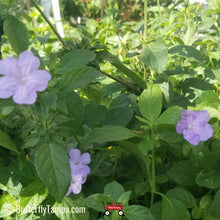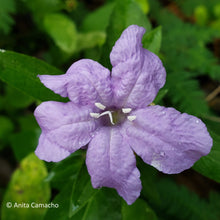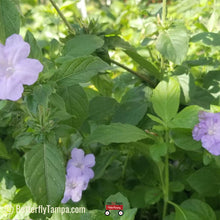Wild Petunia is a native wildflower found throughout Florida in native woodlands. Although the common name is petunia, the flowers in the Ruellia genus are not true petunias, which are members of the Solanaceae (nightshade) family. They spread and are known as strong growers under adverse conditions. It likes dry, sandy soils to moist soils, full sun to partial shade and is easy to grow - a very adaptable groundcover and does well when mixed with other low-growing flowers. This 12"-tall plant, remains low-growing and has light green leaves that are medium in texture. Blue or violet flowers appear on this perennial in the spring, summer and fall. Flowers only remain open for a day, but plants have a high yield and a long blooming period. These flowers are showy, and their nectar is appealing to various species of butterflies and is a host plant for the White peacock and Common Buckeye butterflies.
Caution: Many big box garden centers sell the highly invasive Mexican petunia (Ruellia simplex). This species is a FLEPPC-listed Category I invasive species, which means it has escaped cultivation and is known to alter native plant communities by displacing native species. (See fleppc.org for more information and to see a list of Category I and II species). Mexican petunia spreads quickly and does not respond well to herbicides. You can help control the spread of this invasive species by not planting it in your landscape and instead planting the native Ruellia species.








